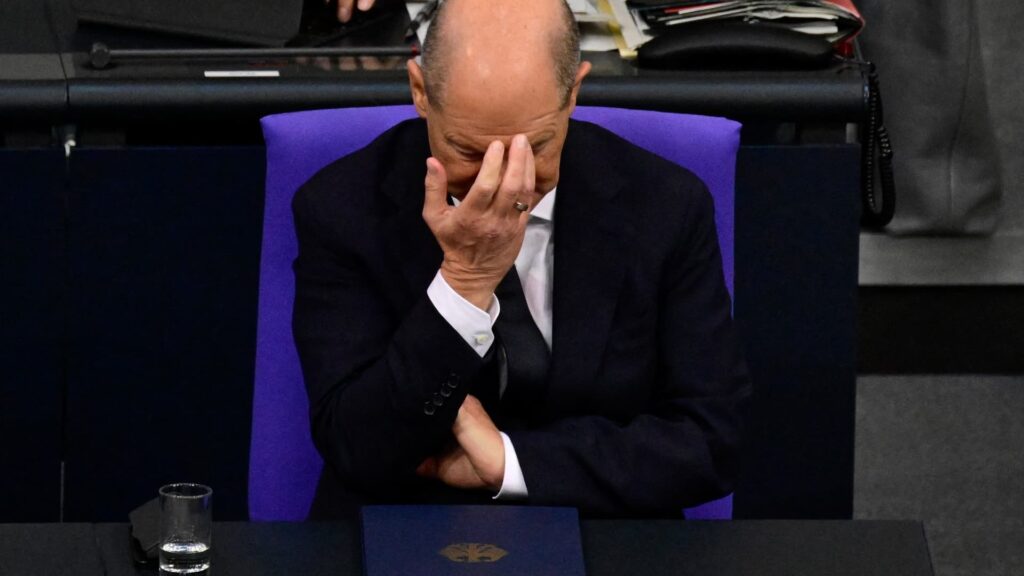The debt brake rule that helped collapse Germany’s government

German Chancellor Olaf Scholz attends a session on November 13, 2024 at the Bundestag.
John Macdougall | Afp | Getty Images
When the German government collapsed earlier this month, clashes within the former ruling coalition about economic and budget policy were widely cited as a key factor — with the country’s debt brake playing a central role.
Former Finance Minister Christian Lindner, whose sacking was the tipping point for the ruling coalition breaking up, told press in early November that German Chancellor Olaf Scholz had demanded a pause to the debt brake, a request he could not accept.
Scholz had fired Lindner that same day, saying that the former finance minister did not seem willing to cooperate on Scholz’ suggestions for Germany’s 2025 budget. Scholz claimed that his plans incorporated the ideas of Lindner’s party, but also clearly demonstrated the need for more financial leeway.
Tensions about fiscal policy had long been brewing, heightened by ongoing concerns about the state of the country’s economy, which has been teetering on the edge of recession for several quarters. A second reading of third-quarter GDP released Friday indicated 0.1% growth from the previous quarter.
And so the three-year-old coalition between Scholz’ social democratic party (SPD), the Green party and Lindner’s free democratic party (FDP) fell apart. Germany is now facing early elections in February.
But what is the debt brake and why is it so contentious?
What is the debt brake?
Germany’s debt brake, or ‘Schuldenbremse,’ is a fiscal rule that forms part of the German constitution. The debt brake limits how much debt the government can take on, and dictates that the size of the federal government’s structural budget deficit must not exceed 0.35% of the country’s annual gross domestic product.
It was agreed upon in 2009 in response to the financial crisis of 2008 and the sky-high debt the German government had at the time.
In some exceptional circumstances, the debt brake can be suspended — this happened for example during the Covid-19 pandemic.
Germany’s government debt is just over 60% of its gross domestic product, according to the European Commission, which is below the debt to GDP ratio of other large euro zone countries.

When the debt brake was first implemented, its advocates argued that it would ensure a sustainable, responsible approach to public finances and spending. To this day, this remains a popular argument in favor of the policy.
Critics meanwhile, say the debt brake is too restrictive, and that it has hampered investment which is necessary for a successful future.
Philippa Sigl-Glöckner, the founder and managing director of the think tank Dezernat Zukunft, last week told CNBC’s Annette Weisbach that the debt brake has resulted in “a huge lack in investment.”
Infrastructure like Germany’s train network and education are now suffering, she indicated. “And for me, that is a consequence of the debt break,” she said.
A point of contention
In the now former ruling coalition, views on the debt brake differed.
Scholz’ SPD for example has repeatedly advocated for a reform of the debt brake, calling for a broader scope for what can be seen as a worthwhile emergency situation for suspending it, for example climate change and the Russia-Ukraine war.
Lindner’s FDP has supported the view that the debt brake rule must be adhered to and has argued that remaining effects from the Covid-19 pandemic, the climate emergency and the war in Ukraine are long-term challenges for the government rather than emergency situations. This has marked a shift in policy however, as the FDP abstained in the 2009 vote on adding the debt brake to the German constitution.
The debt brake became even more contentious after the German constitutional court last year ruled that it was unlawful for the government to re-allocate emergency debt taken on during the Covid-19 pandemic to the budget. At the time, some observers and government figures argued that the climate crisis was likewise an emergency, but the court’s ruling stood.
The ruling, which enforced a “strict interpretation of the debt brake,” was a key contributor to growing disputes within the former coalition about “how to deal with the lack of fiscal space,” Holger Schmieding, chief economist at Berenberg, told CNBC.
But while the debt brake was an important factor in the government’s break up, Carsten Brzeski, global head of macro at ING, said other factors were also at play.
“Lindner’s almost religious sticking to the debt brake, even though he had shown some flexibility in the past, suggests that there was a political motive,” he told CNBC. “I think that the government collapsed mainly due to political reasons and personal tensions.”
The future of the debt brake
As attention now turns to the upcoming election, questions about the future of the debt brake under a new coalition government have emerged. Polls suggest that the current opposition party, the Christian democratic party, will secure the biggest vote share and therefore deliver the next chancellor.

Berenberg’s Schmieding said that if elected, the CDU will likely enter a coalition and strike a deal with a center-left party such as the SPD or Green party.
He predicted that the CDU, along with its Bavarian affiliate party CSU, will agree “to a modest reform of the debt brake to create fiscal space for more military spending and investment. In return, the centre-left will agree to some pro-growth reforms including a pruning of welfare benefits, less generous conditions for early retirement and lower business taxes.”
ING’s Brzeski also expects the debt brake to soften, but pointed out that any structural changes to the law will require a two-thirds majority in parliament as the fiscal rule is part of the constitution — meaning the outcome will also depend on the broader parliamentary make up.
Others have been more hesitant, with Marcel Fratzscher, president of DIW Berlin last week telling CNBC’s Weisbach that he believes the new government “will not really touch” the debt brake.
Public support for it is high, and the country “has an obsession with savings and debts,” he said. Symbolic change could come, such as how the structural components of the debt brake are calculated, he explained — “but not really a fundamental change that we would urgently need in Germany to push public investment.”
Brzeski meanwhile argued that even without major debt brake reforms, there could still be some movement in Germany’s fiscal policy, for example through a special purpose vehicle designed to fund investments.
“In any case, I expect additional fiscal stimulus of 1% to 2% GDP over the next five to ten years. This would finally close the large investment gap, which has been growing over the last ten years.”
#debt #brake #rule #helped #collapse #Germanys #government
News plays a pivotal role in our lives by keeping us informed and connected to the world. It serves as a critical source of information, offering updates on current events, politics, economics, science, and more. Through news, we gain awareness of global issues and local developments, helping us make informed decisions in our personal and professional lives. News also fosters discussion and debate, encouraging critical thinking and perspective-taking. Moreover, it promotes transparency and accountability among governments, businesses, and other institutions. In a rapidly changing world, staying updated with the news enables us to adapt to new challenges and opportunities, shaping our understanding of the complexities of society. Ultimately, news is not just about information; it empowers us to participate actively in the world around us, contributing to a more informed, engaged, and responsible global citizenry.
Health is fundamental to our well-being and quality of life, making it an essential aspect of daily existence. It encompasses physical, mental, and emotional aspects, influencing our ability to function effectively and enjoy life fully. Prioritizing health allows individuals to maintain optimal physical fitness, reducing the risk of diseases and promoting longevity. Mental health, equally crucial, affects our cognitive abilities, emotional stability, and overall happiness. Investing in preventive healthcare through exercise, balanced nutrition, and regular medical check-ups helps in early detection of potential health issues, ensuring timely intervention and treatment. Beyond individual benefits, a population’s health impacts societal productivity and economic stability. Governments and organizations worldwide emphasize public health initiatives to address pandemics, health disparities, and promote overall well-being. Ultimately, health serves as the foundation upon which we build our lives, influencing our ability to pursue goals, nurture relationships, and contribute meaningfully to society.
Money plays a crucial role in our lives as a means of financial security and freedom. It enables us to meet basic needs such as food, shelter, and healthcare, while also providing opportunities for education, travel, and personal growth. Beyond material comforts, money facilitates social connections and experiences that enrich our lives. It empowers individuals to invest in their futures, whether through savings, investments, or entrepreneurial ventures, thereby fostering economic stability and growth. However, the pursuit of wealth should also be balanced with ethical considerations, as money can influence relationships and societal dynamics. Responsible management of finances is key to achieving long-term goals and mitigating financial stress. Ultimately, while money is a tool for achieving aspirations and fulfilling desires, its true value lies in how it is utilized to improve both personal well-being and the broader community.
Earning Easy Money in 2024: Opportunities and Considerations 💸
In 2024, the landscape of earning easy money presents diverse opportunities, albeit with considerations. The digital age offers platforms for freelancing, online trading, and e-commerce, allowing individuals to leverage skills and creativity for financial gain. Cryptocurrency investments continue to allure with potential for quick profits, yet they entail high volatility and risk. Moreover, the rise of the gig economy enables flexible work arrangements through apps and websites, offering quick payouts but often without job security or benefits. Passive income streams such as rental properties and investments in stocks or bonds remain viable, but demand initial capital and ongoing management. Amid these options, caution is essential to avoid scams and unsustainable ventures promising overnight success. Ultimately, while the allure of easy money persists, informed decisions, diligence, and a long-term perspective are crucial for sustainable financial growth and security in the dynamic year ahead.





